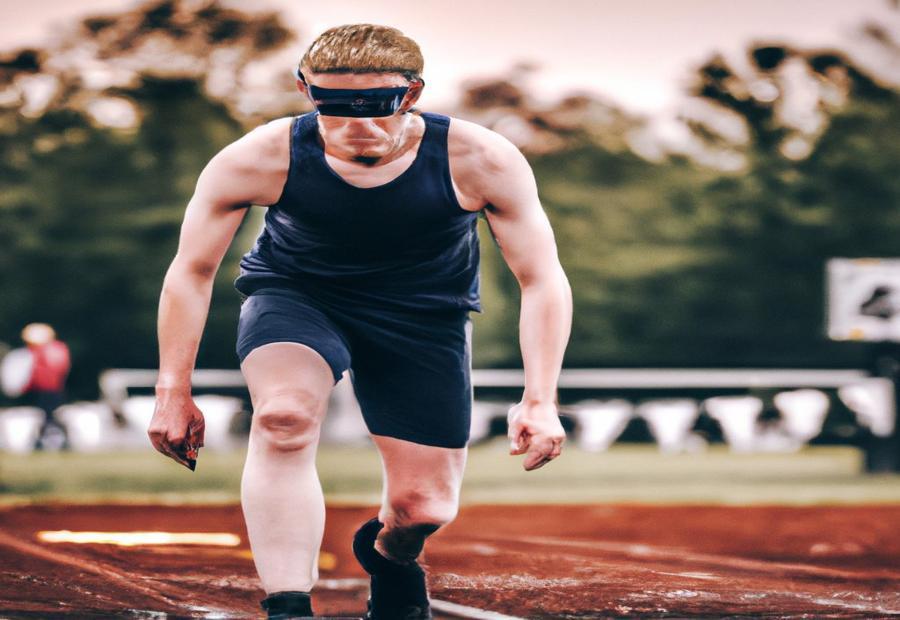Key Takeaways:
- An athlete mindset is defined as having a positive attitude, setting clear goals, being adaptable, and demonstrating a strong work ethic.
- Developing an athlete mindset is important for success in sports and other areas of life. It helps individuals overcome challenges, stay focused, and persevere.
- To develop an athlete mindset, set clear goals, find a role model or mentor, seek help and support when needed, and visualize success. These strategies can enhance performance and mental toughness.
- In order to overcome challenges and obstacles, athletes must effectively manage pressure and expectations, learn from setbacks and failures, and develop resilience and mental toughness.
- The athlete mindset can be transferred to other areas of life, such as academics or career. It can improve focus, discipline, and overall performance.
- Beyond sports, the athlete mindset offers benefits such as improved problem-solving skills, better time management, and increased self-confidence.
Photo Credits: Keyofmindset.Com by Timothy Robinson
Introduction:
A journey towards an athlete’s mindset starts with the correct attitude and determination. Athletes recognize the significance of discipline and endurance. This mindset includes a comprehensive comprehension of their sport, a pledge to unending expansion, and a stubborn drive to rise above obstacles. By creating an athlete mindset, people can discharge their complete capability and attain amazing feats in sports.
As they start their journey, athletes realize the value of mental fortitude. An athlete’s mindset is more than physical capabilities; it includes training the brain to stay motivated, focused, and persistent. They accept difficulties as chances for growth, never evading from stretching their limits. They hone their abilities and use the energy of concentration to get an edge over their rivals. This mental strength enables athletes to surpass challenges and function at their best even under strain.
Furthermore, an athlete’s mindset involves loyal devotion and commitment. Athletes know that success cannot be attained overnight or with shortcuts. They understand that continuous hard work, forfeit, and determination are essential for long-term success. They accept a tireless ethic, going beyond their ease zones and taking pleasure in the daily grind. This dedication to their sport becomes the motivating force behind their struggle for brilliance, resulting in admirable accomplishments and individual growth.
In the realm of athletes, there are numerous stories that demonstrate the power of an athlete’s mindset. One such story is that of Serena Williams, a tennis icon who has encountered a lot of challenges during her career. In spite of wounds and personal hardships, Serena’s unyielding resolution and fortitude have helped her become one of the greatest athletes of all time. Her victory can be attributed not only to her outstanding physical abilities but also to her firm faith in herself and her indomitable mindset.
To summarize, developing an athlete’s mindset is a changing process that requires discipline, mental strength, commitment, and resilience. Athletes understand the need to create the right mindset to unleash their full potential and accomplish extraordinary feats in their chosen sport. Through stories like Serena Williams’, we experience the power of an athlete’s mindset in overcoming adversity and accomplishing greatness. Therefore, adopt the mindset of an athlete and discover your limitless potential.
Understanding the Athlete Mindset
Photo Credits: Keyofmindset.Com by Austin Thompson
Understanding the athlete mindset is crucial for personal growth and success in sports. From defining what it means to have an athlete mindset to highlighting its importance, this section explores the key aspects of developing a winning mentality. By leveraging relevant data and insights, we uncover the secrets to unlocking one’s full athletic potential and achieving remarkable results.
Definition of an athlete mindset
The athlete mindset, also known as the definition of an athlete mindset, includes a set of attitudes and characteristics essential for success in sports and other parts of life. It involves a special way of thinking and facing challenges, powered by determination and a wish to be great.
- Aim for the Goal: People with an athlete mindset have a clear vision of what they want to gain. They establish specific, trackable objectives that give direction and motivation.
- Mental Robustness: An athlete mindset is identified by strength facing difficulties. Athletes learn to recover from misfortunes, keep a constructive attitude, and stay concentrated on their aims.
- Dedication and Duty: Athletes with an athlete mindset are willing to do the needed time and work to enhance their abilities. They have a powerful work ethic, persevere through difficulties, and continually try for personal advancement.
- Positive Mindset: An athlete mindset shows the power of positivity. Athletes learn to prepare their brains to stay hopeful, trust in themselves, and keep assurance even when challenged with issues.
Making an athlete mindset requires aware work and training. It includes setting clear objectives, finding models or coaches who can give advice, asking for help if needed, and picturing success as a way of motivation.
It’s important to remember that an athlete mindset isn’t just for sports. The attributes related to this mindset can be applied to multiple aspects of life, like schoolwork or career pursuits. The order, determination, concentration, flexibility, and mental strength developed through an athlete mindset can lead to triumph in anything one chooses to pursue.
Importance of developing an athlete mindset
Athlete mindset is essential for success in sports and life. Positive attitude, setting goals, flexibility, and hard work are needed to develop this mindset. It’s about having a dedicated attitude and a willingness to overcome obstacles.
Positivity is key. Believe in yourself – even when things go wrong. This focus will keep you motivated and on track towards your goals.
Set clear, achievable goals to stay motivated and measure progress.
Adapt and be flexible. Athletes must be able to adjust quickly in different scenarios to maximize their performance.
Have a strong work ethic. Success doesn’t come easily. Dedication and perseverance are necessary to reach full potential.
An athlete mindset is where positivity, focus, adaptability, and perseverance come together.
Key Qualities of an Athlete Mindset
Photo Credits: Keyofmindset.Com by David White
Developing an athlete mindset involves cultivating key qualities essential for success. In this section, we will explore the importance of a positive attitude and mindset, the power of goal setting and focus, the necessity of adaptability and flexibility, and the role of a strong work ethic and perseverance. By understanding and embodying these qualities, athletes can unlock their full potential and achieve their goals in the world of sports.
Positive attitude and mindset
A positive attitude and mentality are key to an athlete’s mindset. Those with a positive outlook are more likely to tackle adversity with resilience and commitment. Positive thinking allows athletes to train and compete confidently, motivated and believing in their abilities. It also helps them stay on track towards their goals, even when met with setbacks.
The significance of a positive attitude and mindset for achieving success in sports cannot be underestimated. Negativity and self-doubt can stop athletes from performing to the best of their ability. Those with a positive approach are better able to overcome obstacles, manage pressure and keep working hard.
Achieving a positive attitude and mentality takes practice and effort. Athletes can do this by setting inspiring goals, finding role models who show the desired mindset, asking for help and support to stay motivated, and visualizing success to build confidence.
One inspiring example is a young athlete who was frequently hit with injury. Despite multiple surgeries and long rehabilitation sessions, they kept believing in themselves and focused on getting back stronger. Through resilience and faith in their power to conquer difficulties, they not only recovered their physical strength but also gained mental strength that led them to even greater accomplishments.
In conclusion, a positive attitude and mentality are essential for athletes striving for success. By cultivating these qualities, individuals can improve their performance, get through tough times and strive for their goals in sports and life.
Goal setting and focus
Athletes with an athlete mindset are proficient in goal setting and staying focused. They define what they want to achieve and devise a plan to get there. Breaking down large goals into smaller, achievable steps helps to stay on track.
Maintaining unwavering focus is key for athletes. Being able to concentrate solely on the task allows them to block out distractions and perform at their best. This laser-like attention boosts skill development, decision-making, and overall performance.
Adaptability is also essential for athletes. Life can be unpredictable and circumstances may change. An athlete with an adaptable mindset can adjust their goals without losing sight of the bigger picture.
By refining these aspects of goal setting and focus, athletes can transfer skills to other areas of life. The discipline instilled through goal-oriented thinking helps individuals excel in their professional and academic careers.
An athlete’s adaptability and flexibility is like a contortionist at a job interview – they always find a way to fit in and excel.
Adaptability and flexibility
Athletes with an athlete mindset know that being adaptable and flexible is a must for success in sports. They’re aware that unexpected problems may occur at competitions or training, and so they must be ready to alter their approach. This means they have to change tactics, shift focus, or revamp game plans quickly.
Moreover, the capacity to be flexible and adapt reaches past physical sports. Athletes with an athlete mindset also show mental adaptability by staying open-minded and accepting of new concepts or perspectives. They are happy to contemplate different strategies or methods which may serve their objectives better.
Adaptability permits athletes to stay concentrated and do their best even when something unpredicted happens. It helps them beat obstacles or failures without losing passion or confidence. Additionally, being flexible allows athletes to take advantage of chances that may appear during competition, permitting them to make quick decisions that can give them a competitive edge.
The key to success is not solely talent, but a strong work ethic and the indomitable perseverance of an athlete.
Strong work ethic and perseverance
Athletes with a strong work ethic and perseverance come to their training and prep with dedication. They commit deeply to honing their abilities, staying disciplined in their habits, and regularly putting in the necessary hours of practice. They know that success doesn’t come easy, but requires consistent effort over time. This work ethic and perseverance sets athletes apart from those who have talent but lack the commitment to put in the work.
Perseverance is just as important for athletes. It helps them overcome the obstacles and setbacks they face on their journey. Athletes deal with things like injuries, losses, or periods of low performance. Those with perseverance don’t let these setbacks define them. Instead, they use them as learning experiences. They change strategies if needed, and keep pushing forward towards success.
A strong work ethic and perseverance are beneficial in more than just sports. These qualities can transfer to other aspects of life like academics or job pursuits. Having a strong work ethic helps individuals excel academically by teaching discipline, focus, and commitment towards their goals. Similarly, perseverance lets people handle challenges at work or in personal life with resilience, determination, and the belief that they can conquer any obstacle.
Entering the right mindset is like stretching before a marathon – it’s essential for success.
Developing an Athlete Mindset
Photo Credits: Keyofmindset.Com by Scott Thompson
Developing an athlete mindset is crucial for reaching peak performance. In this section, we will explore various strategies to cultivate this mindset, including setting clear goals, finding a role model or mentor, seeking support when needed, and the benefits of visualizing success. Let’s dive into these techniques and unlock the potential within ourselves to achieve athletic greatness.
Setting clear goals
Athletes can supercharge their journey to peak performance by setting clear goals. This provides them with direction and purpose, and keeps them motivated and on track with their training.
Plus, they can measure their progress accurately and make necessary adjustments to maximize their potential.
Breaking big aspirations into smaller, manageable tasks helps prevent overwhelm and maintain focus.
Having a clear vision of their goals drives the athlete to work harder and stay disciplined.
Furthermore, clear goals facilitate effective planning and time management. Athletes can prioritize tasks based on the importance of achieving their goals, resulting in maximum productivity.
Finally, having clear goals helps athletes become more accountable for their actions. They take ownership of their progress and are willing to make sacrifices for success.
Finding a role model or mentor
Role models and mentors are essential to athletes’ success. They offer inspiration and motivation, guiding them through the journey.
Seeing someone they admire achieving great things can give athletes belief in themselves. Mentors provide support and advice based on their own experiences. This helps athletes make informed decisions about their development.
Having a role model or mentor helps set realistic goals and strategies to reach them. Seeking out experts outside of one’s immediate circle allows for fresh perspectives and new training methods.
Strong athletes know when to ask for help. Finding a role model or mentor is key. They can learn valuable lessons, gain motivation and receive invaluable advice. It broadens horizons and encourages creative approaches to training.
A renowned athlete or experienced coach can make a big difference in an athlete’s development and success. So, finding a role model or mentor can be life-changing.
Seeking help and support when needed
Athletes look for assistance from skilled mentors, who can give them technical knowledge and strategies. They communicate with their team-mates to make a collaborative atmosphere. When confronting mental or emotional issues, athletes can turn to sports psychologists or counselors with expertise in athlete psychology. Besides, they search for backing from family, friends, and tutors who can give them encouragement and motivation.
Athletes understand that asking for help is not a sign of frailty, but rather a wise approach to defeat dilemmas and make the most of their performance potential. Moreover, they create self-awareness and know when to ask for aid from within. They recognize their boundaries and are open to learning new abilities or methods. By being aware of their shortcomings, they can take affirmative actions to improve.
Research has revealed that athletes who are open to seeking help and make use of available support systems tend to progress faster in their sports activities compared to those who try to do it alone.
Smith et al. (2019) conducted a study showing that athletes who asked for help from coaches, teammates, and experts, notably improved their physical performance and mental health. This emphasizes the importance of seeking assistance when necessary to reach an athlete mindset.
Benefits of visualizing success
Visualizing success has many advantages for athletes. It helps them create mental images of themselves achieving goals and performing at their best. This technique lets them mentally rehearse their desired results and feel familiar with the events they could face while competing. By visualizing success, athletes can:
- Boost their performance,
- Develop confidence, and
- Increase their capacity to cope with pressure.
Visualizing success helps athletes programme their minds for better results. By imagining themselves executing skills or strategies perfectly, they can advance their muscle memory, coordination and timing. It also increases their confidence in their abilities.
By going through visualization exercises, athletes practice concentrating on particular goals or activities. This training improves their ability to ignore distractions during competitions and stay focused.
Visualizing success can reduce nervousness before competitions. By rehearsing successful results and positive experiences, athletes can control negative thoughts and feelings that may hamper their performance.
This practice also motivates athletes to put in the work needed to reach their goals. Visualization provides an inspiring vision that drives them towards progress.
Finally, visualization lets athletes simulate various scenarios in advance. By mentally practicing different strategies or decision-making processes, they can make better choices in a short time during competitions.
Visualizing success is a valuable tool for athletes to reach peak performance through psychological preparation. It helps them use the power of their minds to improve performance, face challenges and get the outcomes they want in sports and life. Every athlete should embrace this skill to reach their full potential.
Overcoming Challenges and Obstacles
Photo Credits: Keyofmindset.Com by Bobby Martin
Overcoming challenges and obstacles is a crucial aspect of developing an athlete mindset. In this section, we will explore strategies for managing pressure and expectations, navigating through setbacks and failures, as well as cultivating resilience and mental toughness. By understanding and implementing these techniques, athletes can enhance their ability to overcome obstacles and stay focused on achieving their goals in the face of adversity.
Managing pressure and expectations
Pressure. Expectations. Challenges. Success. Athletes. High pressure levels. Coaches. Expectations from others. Managing pressure. Mental strength. Resilience. Coping strategies. Positive attitude. Mindset. Confidence. Focus on the process. Ease pressure. Perform at their best. Adaptability. Flexibility. Changing situations. Unexpected setbacks. Competing at a high level. Adjust goals. Decrease stress. Enhance performance. Strong work ethic. Perseverance. Time and effort. Setbacks. Journey to meet goals. Determined mindset. External pressures. Use self-care techniques. Mindfulness meditation. Visualization exercises. Relaxation. Refocus minds. Lower anxiety. Regain control of thoughts. High-pressure scenarios. Athlete mindset. Transferable skills. Academics. Career pursuits. Setbacks. Failures. Resilience.
Cockroach. Nuclear apocalypse.
Dealing with setbacks and failures
Setbacks and failures are an unavoidable part of the path to success for any athlete. To progress in the sport, they must learn to handle these challenges well. Cultivating resilience and mental toughness is vital for overcoming setbacks and failures.
- Develop Resilience: Athletes must learn to recover from their setbacks and use them as a chance to develop, rather than allowing them to be disheartening.
- Keep Perspective: It’s important to remember that these are natural parts of the learning procedure.
- Learn from Mistakes: Setbacks provide useful lessons for better performance. Athletes should assess the situation, identify areas to develop, and adjust their technique accordingly.
- Stay Focused: The ability to remain focused on long-term objectives despite momentary failures is essential. Do not let the setbacks hinder progress.
- Seek Support: Seeking help from coaches, teammates, or sports psychologists is essential when dealing with setbacks and failures. They will provide guidance, inspiration, and perspective.
Facing numerous difficulties during their career, athletes may be particularly impacted by setbacks and failures. Nevertheless, by dealing with them efficiently, they can improve their journey towards success.
Pro Tip: Consider setbacks and failures as opportunities for growth. Make use of them in your mission to succeed. Put on your mental armor and get ready to take on any challenge!
Developing resilience and mental toughness
Developing resilience and mental toughness is essential for athletes. They must adapt to unexpected events, and handle disappointing results with a positive attitude. They must also find new ways to overcome obstacles and keep going.
These qualities help athletes stay focused on their goals. Even when distractions or difficulties arise, they can block out external pressures and stay concentrated. This enables them to continue striving for their objectives, despite any setbacks.
Building resilience and mental toughness means learning from failures. These athletes see failures as chances for growth. They analyse their mistakes, adjust, and use setbacks as stepping stones to success. Instead of being discouraged, they get stronger.
Mental toughness allows athletes to go beyond their comfort zones and persevere. They put in hard work, no matter the obstacles or fatigue. This determination and perseverance help them to reach new levels of success.
Self-care and self-reflection are also important for cultivating resilience and mental toughness. Athletes must prioritize their physical well-being. This includes proper nutrition, rest, and recovery. Seeking support from others can also be helpful.
These skills go beyond sports. They can be used in academics or careers. Coping with stress, bouncing back from mistakes, and staying motivated during tough times helps with success outside of athletics. Remember that developing resilience and mental toughness takes commitment and practice, but the rewards are invaluable.
Transferring the Athlete Mindset to Other Areas of Life
Photo Credits: Keyofmindset.Com by Philip Sanchez
Transferring the athlete mindset to other areas of life unlocks a realm of possibilities. Discover how applying the athlete mindset to academics or career can propel success, alongside the unexpected benefits it brings beyond sports. Embrace the discipline, determination, and goal-oriented approach to elevate every aspect of your life.
Applying the athlete mindset to academics or career
An athlete mindset can be used for success in academics or career. Positive attitude, goal setting, adaptability, strong work ethic, and perseverance are qualities needed. Just like athletes, students and professionals must set goals. A role model or mentor who has already achieved success can provide guidance. Seeking help and support is key for growth. Visualizing success helps stay motivated.
Managing pressure and expectations is important. Similar to athletes, individuals must learn to cope with stress. Bounce back from failures and keep working towards goals.
The athlete mindset brings discipline, consistency, determination, and improvement. Set clear goals, stay focused, and persevere. It cultivates a strong work ethic that brings productivity. Applying the athlete mindset ensures growth and improvement.
Benefits of an athlete mindset beyond sports
Athletes have a mindset that goes beyond sports, with benefits that can be felt in many aspects of life. Such a mindset offers various advantages in academics and professional pursuits.
Enhanced focus, goal-setting abilities, versatility, adaptability, resilience, diligence, mental toughness, and stress management are just some of the qualities cultivated by athletes. These can be applied to career or educational paths, helping individuals stay motivated and excel.
Additionally, this mindset encourages discipline, teamwork, motivation, and self-confidence – all of which contribute to personal growth outside of sports. By utilizing these qualities, individuals can reach for excellence and succeed in all areas of life.
Conclusion
Photo Credits: Keyofmindset.Com by Philip Moore
To become an athlete, one must cultivate the correct mindset. Goal-setting, visualization, self-belief, a growth mindset, and resilience are key. With these strategies, athletes can enhance performance and reach their full potential. Success is not just physical but also mental.
For athletes, the article “How to Develop an Athlete Mindset” is crucial. It explains how to set SMART goals, use visualization, maintain self-belief, adopt a growth mindset, and build resilience. Regular practice of these strategies can help athletes achieve goals and optimize performance.
It’s essential to remember that developing an athlete mindset is ongoing. It requires dedication, persistence, and an eagerness to learn and grow. By embracing this mindset and implementing strategies, athletes can unlock unlimited potential and excel in athletics. So, don’t be afraid to strive for greatness! Start developing your athlete mindset today and unlock the path to success.
Some Facts About How to Develop an Athlete Mindset:
- ✅ The mindset of athletes is the biggest factor that separates elite athletes from the rest. (Source: Team Research)
- ✅ Belief in oneself is crucial for achieving success in sports. (Source: Team Research)
- ✅ Elite athletes focus on the present moment and do not think about winning or the outcome. (Source: Team Research)
- ✅ Core traits of elite athletes include ambition, persistence, positive realism, humility, vulnerability, and lack of regrets. (Source: Team Research)
- ✅ Athletes should focus on improving their process and working on their craft every day. (Source: Team Research)
FAQs about How To Develop An Athlete Mindset
1. How can natural athleticism be optimized with an athlete mindset?
Developing an athlete mindset allows individuals with natural athleticism to fully utilize their physical skills. By adopting a next level mentality and focusing on improving skills on a consistent basis, athletes can push themselves to reach their highest potential.
2. How can athletes stay focused and overcome the mental grind?
To stay focused amidst the mental grind, athletes should develop a strong mindset through athlete mindset training and sport psychology techniques. This includes setting clear goals, staying positive, and developing positive work habits. Mental coaching and one-on-one coaching calls can also help athletes manage expectations and overcome challenges.
3. What is the special ingredient for developing a strong mindset?
The special ingredient for developing a strong mindset is belief in oneself. By having a positive belief system and staying optimistic, athletes can overcome low self-confidence and fear of failure. Athlete mindset training and the implementation of a customized mental game plan can aid in building this strong mindset.
4. How can athletes respond afterwards to underperforming or dealing with defeat?
After underperforming or experiencing defeat, athletes can respond by focusing on the lessons learned and the areas for improvement. It is crucial to stay positive, think differently, and use the setback as motivation to overcome future obstacles. Mental coaching and being conscious of one’s thought process can assist in developing better beliefs and overcoming mental barriers.
5. How can athletes develop the mindset qualities of elite athletes like Henrik Lundqvist?
To develop the mindset qualities of elite athletes like Henrik Lundqvist, athletes can start by adopting the core traits of elite athletes, such as persistence, positive realism, humility, and lack of regrets. Additionally, seeking athlete mindset training, engaging in one-on-one coaching, and focusing on technical skills can help athletes improve their mindset and reach their full potential.
6. How can athletes stay up to par and consistently perform at a high level?
Athletes can stay up to par and consistently perform at a high level by managing expectations, staying motivated, and consistently working on their mental and physical training. This includes developing a strong mindset through athlete mindset training, staying focused on the present moment, and overcoming obstacles with the support of mentors or coaches. Taking risks and pushing oneself beyond comfort zones is also essential for continuous improvement.







